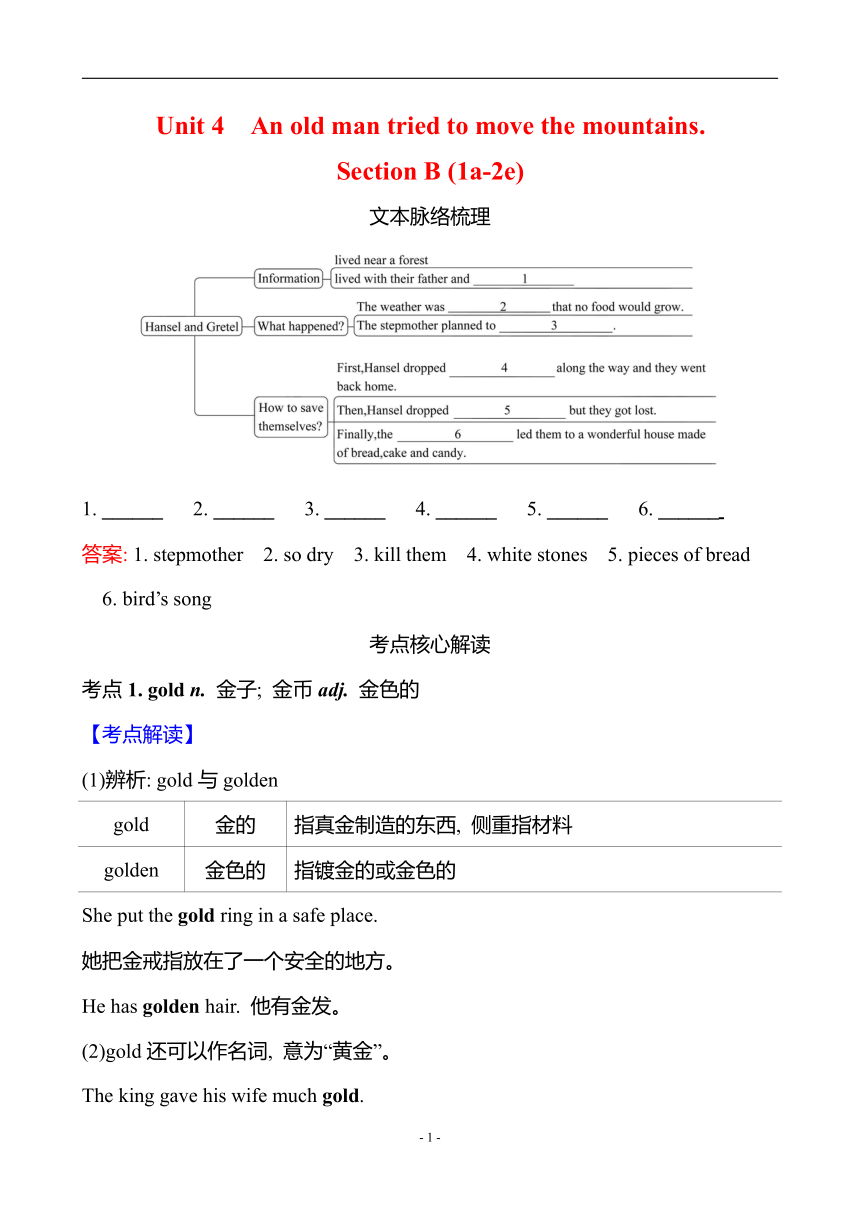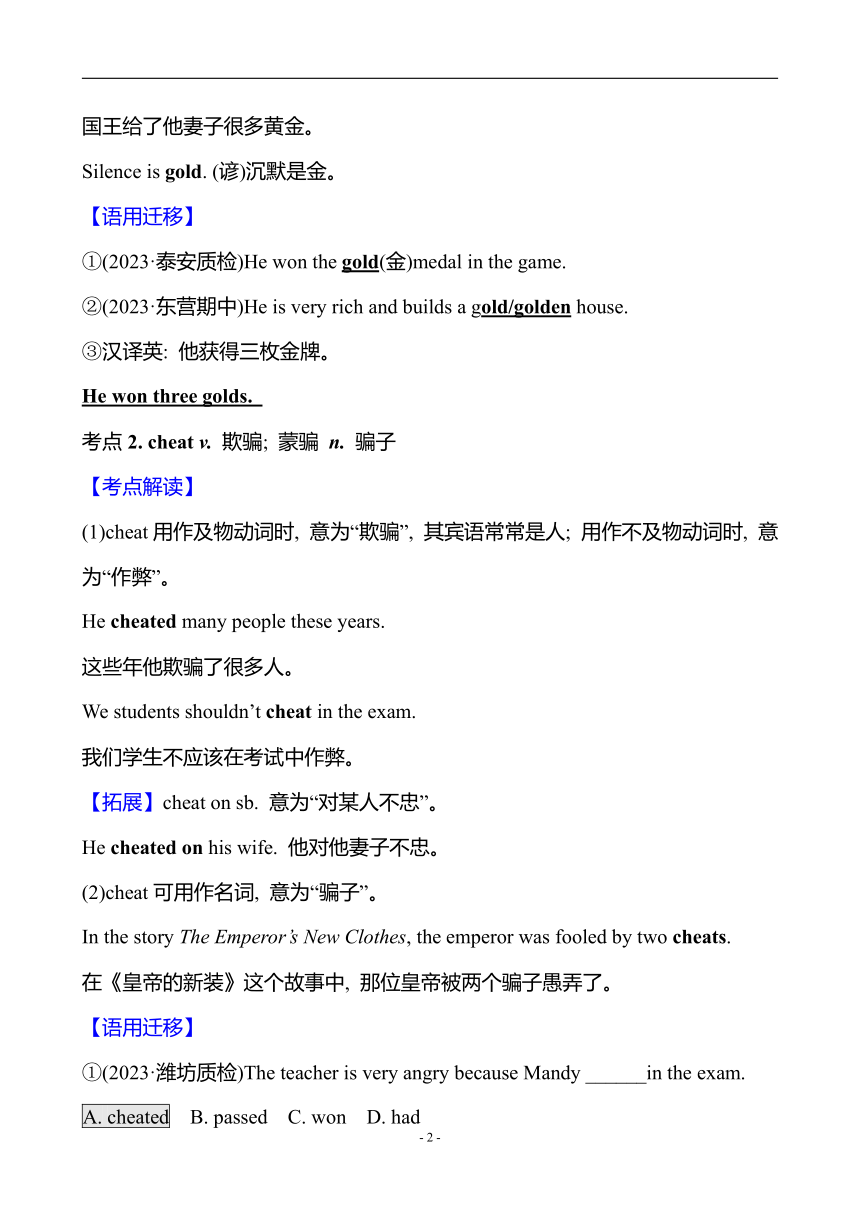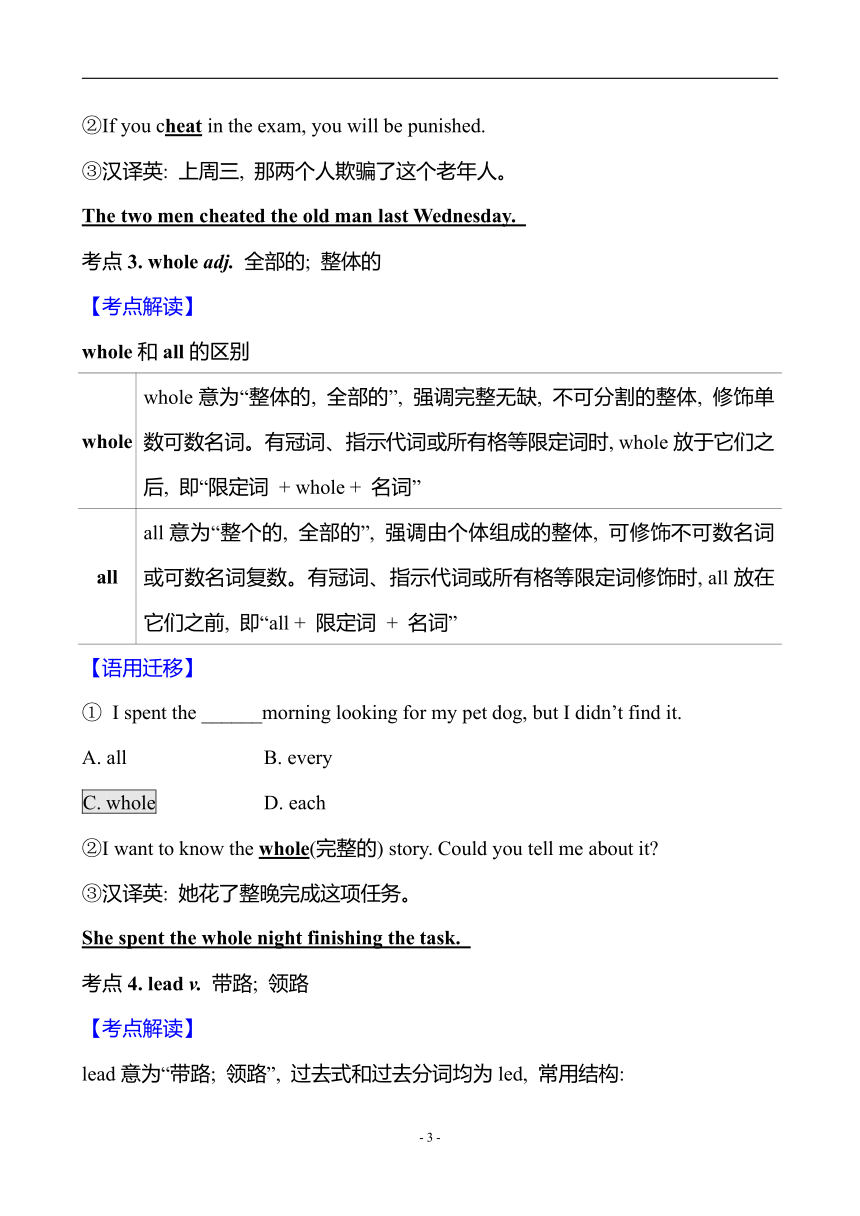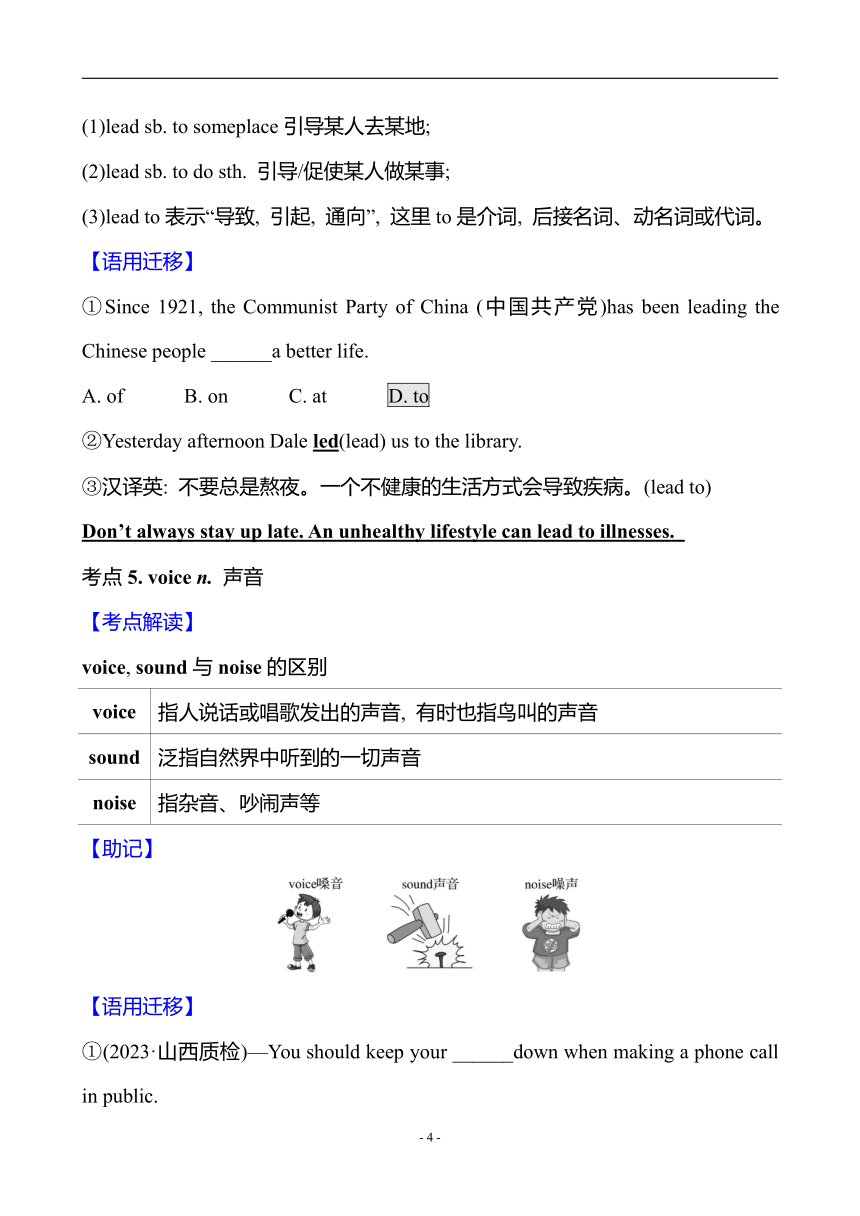Unit 4 An old man tried to move the mountains. Section B (1a-2e) 学案(含答案) 2024-2025学年英语鲁教版八年级上册
文档属性
| 名称 | Unit 4 An old man tried to move the mountains. Section B (1a-2e) 学案(含答案) 2024-2025学年英语鲁教版八年级上册 |

|
|
| 格式 | docx | ||
| 文件大小 | 166.1KB | ||
| 资源类型 | 教案 | ||
| 版本资源 | 鲁教版 | ||
| 科目 | 英语 | ||
| 更新时间 | 2024-06-13 00:00:00 | ||
图片预览




文档简介
Unit 4 An old man tried to move the mountains.
Section B (1a-2e)
文本脉络梳理
1. ______ 2. ______ 3. ______ 4. ______ 5. ______ 6. ______
答案: 1. stepmother 2. so dry 3. kill them 4. white stones 5. pieces of bread
6. bird’s song
考点核心解读
考点1. gold n. 金子; 金币adj. 金色的
【考点解读】
(1)辨析: gold与golden
gold 金的 指真金制造的东西, 侧重指材料
golden 金色的 指镀金的或金色的
She put the gold ring in a safe place.
她把金戒指放在了一个安全的地方。
He has golden hair. 他有金发。
(2)gold还可以作名词, 意为“黄金”。
The king gave his wife much gold.
国王给了他妻子很多黄金。
Silence is gold. (谚)沉默是金。
【语用迁移】
①(2023·泰安质检)He won the gold(金)medal in the game.
②(2023·东营期中)He is very rich and builds a gold/golden house.
③汉译英: 他获得三枚金牌。
He won three golds.
考点2. cheat v. 欺骗; 蒙骗 n. 骗子
【考点解读】
(1)cheat用作及物动词时, 意为“欺骗”, 其宾语常常是人; 用作不及物动词时, 意为“作弊”。
He cheated many people these years.
这些年他欺骗了很多人。
We students shouldn’t cheat in the exam.
我们学生不应该在考试中作弊。
【拓展】cheat on sb. 意为“对某人不忠”。
He cheated on his wife. 他对他妻子不忠。
(2)cheat可用作名词, 意为“骗子”。
In the story The Emperor’s New Clothes, the emperor was fooled by two cheats.
在《皇帝的新装》这个故事中, 那位皇帝被两个骗子愚弄了。
【语用迁移】
①(2023·潍坊质检)The teacher is very angry because Mandy ______in the exam.
A. cheated B. passed C. won D. had
②If you cheat in the exam, you will be punished.
③汉译英: 上周三, 那两个人欺骗了这个老年人。
The two men cheated the old man last Wednesday.
考点3. whole adj. 全部的; 整体的
【考点解读】
whole和all的区别
whole whole意为“整体的, 全部的”, 强调完整无缺, 不可分割的整体, 修饰单数可数名词。有冠词、指示代词或所有格等限定词时, whole放于它们之后, 即“限定词 + whole + 名词”
all all意为“整个的, 全部的”, 强调由个体组成的整体, 可修饰不可数名词或可数名词复数。有冠词、指示代词或所有格等限定词修饰时, all放在它们之前, 即“all + 限定词 + 名词”
【语用迁移】
① I spent the ______morning looking for my pet dog, but I didn’t find it.
A. all B. every
C. whole D. each
②I want to know the whole(完整的) story. Could you tell me about it
③汉译英: 她花了整晚完成这项任务。
She spent the whole night finishing the task.
考点4. lead v. 带路; 领路
【考点解读】
lead意为“带路; 领路”, 过去式和过去分词均为led, 常用结构:
(1)lead sb. to someplace引导某人去某地;
(2)lead sb. to do sth. 引导/促使某人做某事;
(3)lead to表示“导致, 引起, 通向”, 这里to是介词, 后接名词、动名词或代词。
【语用迁移】
①Since 1921, the Communist Party of China (中国共产党)has been leading the Chinese people ______a better life.
A. of B. on C. at D. to
②Yesterday afternoon Dale led(lead) us to the library.
③汉译英: 不要总是熬夜。一个不健康的生活方式会导致疾病。(lead to)
Don’t always stay up late. An unhealthy lifestyle can lead to illnesses.
考点5. voice n. 声音
【考点解读】
voice, sound与noise的区别
voice 指人说话或唱歌发出的声音, 有时也指鸟叫的声音
sound 泛指自然界中听到的一切声音
noise 指杂音、吵闹声等
【助记】
【语用迁移】
①(2023·山西质检)—You should keep your ______down when making a phone call in public.
—OK, I will.
A. voice B. noise
C. sound D. laughter
②Linda is telling her secret to her friend in a low voice(声音).
③她天生有一副好嗓子。
She was born with a good voice.
课时分层演练
【A层 基础练】
Ⅰ. 根据句意及首字母或汉语提示完成单词
1. He has been reading a story book for a whole morning.
2. It was a nice day and the sun shone(照耀)brightly.
3. My daughter’s sweet voice (嗓音)always makes me relaxed.
4. She got well after a brave (勇敢的)fight against cancer(癌症).
5. Four new inventions in China will lead (带路; 领路) the world to a new period.
Ⅱ. 用方框中所给词的适当形式填空
marry wife bright gold ground
1. Tom got married last month. His wife is a doctor.
2. The sun is shining brightly in the sky.
3. Jim and Mike are good friends and their wives are good friends, too.
4. On my way to school, I happened to see an old man lying on the ground and helped him to the hospital.
5. (2022·镇江中考改编) The moment Xu Mengtao won the gold medal in the 2022 Winter Olympics moved me the most.
Ⅲ. 完成句子
1. 请在7点钟叫醒我。
Please wake me up at 7: 00.
2. 狗把警察领到大山附近的一栋房屋。
A dog led the police to a house near the mountain.
3. 他们计划在一个月内完成工作。
They made a plan to finish the work in a month.
4. 河水污染严重, 水中不再有鱼了。
The river was polluted badly and there was no more fish in the water.
5. 那个男孩够勇敢, 敢在夜里独自一个人在山中走。
The boy was brave enough to walk in the mountain alone at night.
【B层 能力练】
Ⅳ. 阅读理解
(2023·重庆中考改编)
What does the Mouse’s tail look like It’s thin and has little hair. But it wasn’t like that before. Long ago, the Mouse’s tail was bushy. He loved his tail so much that he talked about it with everyone he met.
One day, the Rabbit heard the Mouse talking to the Monkey about his tail again. The Rabbit couldn’t stand him anymore. He decided to do something. There was a big party in the forest and all the animals would go to it.
“Mr Mouse, let me comb(梳理)your tail. I’m sure you will be the star at the party, ” the Rabbit said. The Mouse agreed, and the combing made him soon fall asleep. When he woke up, he saw his tail in a silk bag. “I put your tail in the bag so that it won’t get dirty on the way to the party, ” the Rabbit explained.
“Excellent! ” said the Mouse. As soon as he arrived at the party, the Mouse opened the silk bag. But when he saw his tail, he cried. His long beautiful tail was gone. The Rabbit cut off the hair on his tail. All the other animals at the party laughed at him loudly.
1. The underlined word “bushy” means “______” in Chinese.
A. 短粗的 B. 多毛的
C. 光滑的 D. 难看的
2. The Rabbit couldn’t stand ______.
A. the Mouse B. the party
C. the Monkey D. his own tail
3. The Rabbit ______when the mouse was sleeping.
A. prepared for the party
B. combed the Mouse’s tail
C. cut off the hair on the Mouse’s tail
D. made a silk bag
4. The Rabbit put the Mouse’s tail in the bag to ______.
A. hide what he did
B. keep the Mouse’s tail clean
C. make the Mouse’s tail more beautiful
D. give the Mouse a surprise
Ⅴ. 任务型阅读
Once there were four beggars (乞丐). One day, they met at an old temple at night. They were very upset because none of them had much to eat.
“I only got this piece of meat today, ” the first said. “I almost got nothing, ” the second said, “I just picked up a potato outside the vegetable store during the day. ” The third said that all he had was a small bottle of salt. The fourth beggar had not done much better, “I only got some old beans, but they aren’t very nice! ”
As they sat around the fire, the beggar with only a bottle of salt had a great idea. “Let’s put all our things together and boil them. In this way, we can make a tasty dish and share it. ” They all agreed. However, the first beggar thought, “I don’t want to share. I’ll just pretend to throw my meat into the pot. They’ll never know and I’ll eat my meat alone later. ” So he pretended to put the meat into the pot. And at the same time the other beggars had similar ideas to him. At that time, the temple was too dark for the beggars to see what the others were doing.
Finally, one of them suggested that the dish should be ready and, in turn, each of them helped himself to it. They drank the hot water in silence, learning that selfishness doesn’t taste all that good.
阅读短文, 回答下列问题, 不超过6个词。
1. How did the four beggars feel when they met one day
They felt/were (very) upset. /Upset.
2. What did the second beggar get during the day
A potato. /He got a potato.
3. Who wanted to share with others in the end
Nobody. /No one.
4. Did they have a tasty dish
No, they didn’t.
5. What do you learn from the story
Selfishness doesn’t taste all that good. /We shouldn’t be selfish. /We should learn to share.
【词汇积累】
comb /k um/ n. 梳子v. 梳理
selfishness / selfI n s/ n. 自私
- 9 -
Section B (1a-2e)
文本脉络梳理
1. ______ 2. ______ 3. ______ 4. ______ 5. ______ 6. ______
答案: 1. stepmother 2. so dry 3. kill them 4. white stones 5. pieces of bread
6. bird’s song
考点核心解读
考点1. gold n. 金子; 金币adj. 金色的
【考点解读】
(1)辨析: gold与golden
gold 金的 指真金制造的东西, 侧重指材料
golden 金色的 指镀金的或金色的
She put the gold ring in a safe place.
她把金戒指放在了一个安全的地方。
He has golden hair. 他有金发。
(2)gold还可以作名词, 意为“黄金”。
The king gave his wife much gold.
国王给了他妻子很多黄金。
Silence is gold. (谚)沉默是金。
【语用迁移】
①(2023·泰安质检)He won the gold(金)medal in the game.
②(2023·东营期中)He is very rich and builds a gold/golden house.
③汉译英: 他获得三枚金牌。
He won three golds.
考点2. cheat v. 欺骗; 蒙骗 n. 骗子
【考点解读】
(1)cheat用作及物动词时, 意为“欺骗”, 其宾语常常是人; 用作不及物动词时, 意为“作弊”。
He cheated many people these years.
这些年他欺骗了很多人。
We students shouldn’t cheat in the exam.
我们学生不应该在考试中作弊。
【拓展】cheat on sb. 意为“对某人不忠”。
He cheated on his wife. 他对他妻子不忠。
(2)cheat可用作名词, 意为“骗子”。
In the story The Emperor’s New Clothes, the emperor was fooled by two cheats.
在《皇帝的新装》这个故事中, 那位皇帝被两个骗子愚弄了。
【语用迁移】
①(2023·潍坊质检)The teacher is very angry because Mandy ______in the exam.
A. cheated B. passed C. won D. had
②If you cheat in the exam, you will be punished.
③汉译英: 上周三, 那两个人欺骗了这个老年人。
The two men cheated the old man last Wednesday.
考点3. whole adj. 全部的; 整体的
【考点解读】
whole和all的区别
whole whole意为“整体的, 全部的”, 强调完整无缺, 不可分割的整体, 修饰单数可数名词。有冠词、指示代词或所有格等限定词时, whole放于它们之后, 即“限定词 + whole + 名词”
all all意为“整个的, 全部的”, 强调由个体组成的整体, 可修饰不可数名词或可数名词复数。有冠词、指示代词或所有格等限定词修饰时, all放在它们之前, 即“all + 限定词 + 名词”
【语用迁移】
① I spent the ______morning looking for my pet dog, but I didn’t find it.
A. all B. every
C. whole D. each
②I want to know the whole(完整的) story. Could you tell me about it
③汉译英: 她花了整晚完成这项任务。
She spent the whole night finishing the task.
考点4. lead v. 带路; 领路
【考点解读】
lead意为“带路; 领路”, 过去式和过去分词均为led, 常用结构:
(1)lead sb. to someplace引导某人去某地;
(2)lead sb. to do sth. 引导/促使某人做某事;
(3)lead to表示“导致, 引起, 通向”, 这里to是介词, 后接名词、动名词或代词。
【语用迁移】
①Since 1921, the Communist Party of China (中国共产党)has been leading the Chinese people ______a better life.
A. of B. on C. at D. to
②Yesterday afternoon Dale led(lead) us to the library.
③汉译英: 不要总是熬夜。一个不健康的生活方式会导致疾病。(lead to)
Don’t always stay up late. An unhealthy lifestyle can lead to illnesses.
考点5. voice n. 声音
【考点解读】
voice, sound与noise的区别
voice 指人说话或唱歌发出的声音, 有时也指鸟叫的声音
sound 泛指自然界中听到的一切声音
noise 指杂音、吵闹声等
【助记】
【语用迁移】
①(2023·山西质检)—You should keep your ______down when making a phone call in public.
—OK, I will.
A. voice B. noise
C. sound D. laughter
②Linda is telling her secret to her friend in a low voice(声音).
③她天生有一副好嗓子。
She was born with a good voice.
课时分层演练
【A层 基础练】
Ⅰ. 根据句意及首字母或汉语提示完成单词
1. He has been reading a story book for a whole morning.
2. It was a nice day and the sun shone(照耀)brightly.
3. My daughter’s sweet voice (嗓音)always makes me relaxed.
4. She got well after a brave (勇敢的)fight against cancer(癌症).
5. Four new inventions in China will lead (带路; 领路) the world to a new period.
Ⅱ. 用方框中所给词的适当形式填空
marry wife bright gold ground
1. Tom got married last month. His wife is a doctor.
2. The sun is shining brightly in the sky.
3. Jim and Mike are good friends and their wives are good friends, too.
4. On my way to school, I happened to see an old man lying on the ground and helped him to the hospital.
5. (2022·镇江中考改编) The moment Xu Mengtao won the gold medal in the 2022 Winter Olympics moved me the most.
Ⅲ. 完成句子
1. 请在7点钟叫醒我。
Please wake me up at 7: 00.
2. 狗把警察领到大山附近的一栋房屋。
A dog led the police to a house near the mountain.
3. 他们计划在一个月内完成工作。
They made a plan to finish the work in a month.
4. 河水污染严重, 水中不再有鱼了。
The river was polluted badly and there was no more fish in the water.
5. 那个男孩够勇敢, 敢在夜里独自一个人在山中走。
The boy was brave enough to walk in the mountain alone at night.
【B层 能力练】
Ⅳ. 阅读理解
(2023·重庆中考改编)
What does the Mouse’s tail look like It’s thin and has little hair. But it wasn’t like that before. Long ago, the Mouse’s tail was bushy. He loved his tail so much that he talked about it with everyone he met.
One day, the Rabbit heard the Mouse talking to the Monkey about his tail again. The Rabbit couldn’t stand him anymore. He decided to do something. There was a big party in the forest and all the animals would go to it.
“Mr Mouse, let me comb(梳理)your tail. I’m sure you will be the star at the party, ” the Rabbit said. The Mouse agreed, and the combing made him soon fall asleep. When he woke up, he saw his tail in a silk bag. “I put your tail in the bag so that it won’t get dirty on the way to the party, ” the Rabbit explained.
“Excellent! ” said the Mouse. As soon as he arrived at the party, the Mouse opened the silk bag. But when he saw his tail, he cried. His long beautiful tail was gone. The Rabbit cut off the hair on his tail. All the other animals at the party laughed at him loudly.
1. The underlined word “bushy” means “______” in Chinese.
A. 短粗的 B. 多毛的
C. 光滑的 D. 难看的
2. The Rabbit couldn’t stand ______.
A. the Mouse B. the party
C. the Monkey D. his own tail
3. The Rabbit ______when the mouse was sleeping.
A. prepared for the party
B. combed the Mouse’s tail
C. cut off the hair on the Mouse’s tail
D. made a silk bag
4. The Rabbit put the Mouse’s tail in the bag to ______.
A. hide what he did
B. keep the Mouse’s tail clean
C. make the Mouse’s tail more beautiful
D. give the Mouse a surprise
Ⅴ. 任务型阅读
Once there were four beggars (乞丐). One day, they met at an old temple at night. They were very upset because none of them had much to eat.
“I only got this piece of meat today, ” the first said. “I almost got nothing, ” the second said, “I just picked up a potato outside the vegetable store during the day. ” The third said that all he had was a small bottle of salt. The fourth beggar had not done much better, “I only got some old beans, but they aren’t very nice! ”
As they sat around the fire, the beggar with only a bottle of salt had a great idea. “Let’s put all our things together and boil them. In this way, we can make a tasty dish and share it. ” They all agreed. However, the first beggar thought, “I don’t want to share. I’ll just pretend to throw my meat into the pot. They’ll never know and I’ll eat my meat alone later. ” So he pretended to put the meat into the pot. And at the same time the other beggars had similar ideas to him. At that time, the temple was too dark for the beggars to see what the others were doing.
Finally, one of them suggested that the dish should be ready and, in turn, each of them helped himself to it. They drank the hot water in silence, learning that selfishness doesn’t taste all that good.
阅读短文, 回答下列问题, 不超过6个词。
1. How did the four beggars feel when they met one day
They felt/were (very) upset. /Upset.
2. What did the second beggar get during the day
A potato. /He got a potato.
3. Who wanted to share with others in the end
Nobody. /No one.
4. Did they have a tasty dish
No, they didn’t.
5. What do you learn from the story
Selfishness doesn’t taste all that good. /We shouldn’t be selfish. /We should learn to share.
【词汇积累】
comb /k um/ n. 梳子v. 梳理
selfishness / selfI n s/ n. 自私
- 9 -
同课章节目录
- Unit 1 Could you please clean your room?
- Section A
- Section B
- Unit 2 Why don't you talk to your parents?
- Section A
- Section B
- Unit 3 What were you doing when the rainstorm came
- Section A
- Section B
- Unit 4 An old man tried to move the mountains.
- Section A
- Section B
- Unit 5 What's the highest mountain in the world?
- Section A
- Section B
- Unit 6 Have you read Treasure Island yet?
- Section A
- Section B
- Unit 7 Have you ever been to a museum?
- Section A
- Section B
- Unit 8 I've had this bike for three years.
- Section A
- Section B
